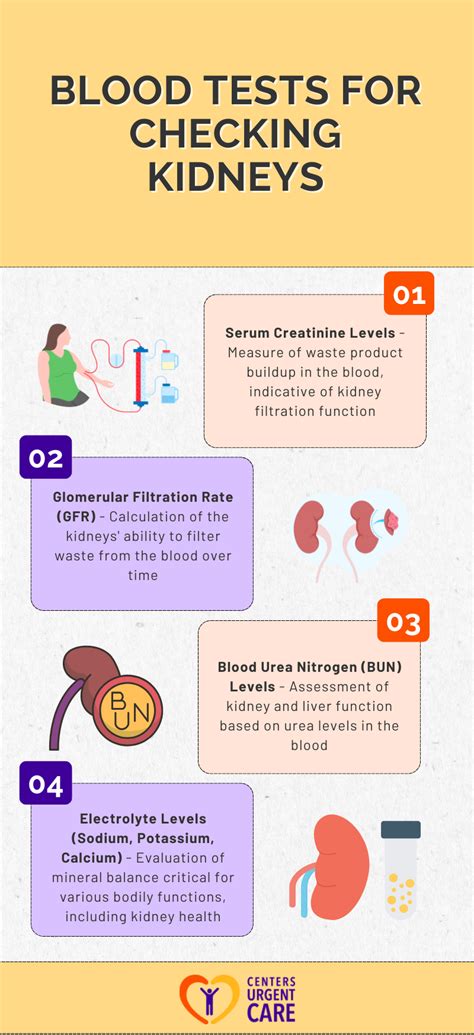7 Blood Work Markers To Check Kidney Function Fast

The kidneys play a vital role in maintaining overall health by filtering waste products, balancing electrolytes, and regulating blood pressure. Monitoring kidney function is essential, especially for individuals with pre-existing medical conditions or those at risk of developing kidney disease. Blood work is a crucial diagnostic tool for assessing kidney health, and several markers can provide valuable insights into kidney function. Here, we’ll delve into seven key blood work markers that help check kidney function quickly and accurately.
1. Creatinine
Creatinine is a waste product from the normal breakdown of muscle tissue. The kidneys are responsible for filtering creatinine from the blood. If the kidneys are not functioning properly, creatinine levels can rise. This marker is one of the most commonly used indicators of kidney function. High creatinine levels may suggest impaired kidney function or kidney disease. It’s essential to note that creatinine levels can be influenced by factors such as muscle mass and age, so interpretations should be made in the context of the individual’s overall health.
2. Urea
Urea, also known as blood urea nitrogen (BUN), is another waste product that the kidneys filter out. Elevated levels of urea in the blood can indicate that the kidneys are not removing waste effectively. However, BUN levels can also be affected by factors unrelated to kidney function, such as dehydration, heart failure, or a high-protein diet. Therefore, BUN is often considered in conjunction with creatinine to get a more comprehensive picture of kidney health.
3. Electrolytes (Potassium, Sodium, Chloride)
Electrolytes are electrically charged minerals that are crucial for various bodily functions, including nerve and muscle function. The kidneys help regulate electrolyte levels. Abnormal levels of electrolytes like potassium, sodium, and chloride can indicate kidney problems. For instance, high potassium levels (hyperkalemia) can be dangerous and may suggest that the kidneys are not adequately filtering potassium from the blood.
4. Phosphate
Phosphate is a mineral that, in excessive amounts, can be harmful. The kidneys regulate phosphate levels by excreting excess phosphate in the urine. In kidney disease, phosphate can accumulate in the blood, leading to a range of complications. Monitoring phosphate levels is particularly important in patients with chronic kidney disease (CKD), as it can help guide dietary restrictions and treatment strategies.
5. Calcium
Calcium is vital for bone health, muscle function, and nerve function. Kidney disease can disrupt the balance of calcium and phosphate in the body, leading to bone disease and other complications. The kidneys help activate vitamin D, which is necessary for calcium absorption. In kidney disease, reduced activation of vitamin D can lead to low calcium levels (hypocalcemia), despite high phosphate levels.
6. Uric Acid
Uric acid is a waste product found in the blood. It’s created during the breakdown of purine nucleotides, substances found in your cells and in certain foods. Normally, uric acid dissolves in the blood, passes through the kidneys, and is excreted in urine. However, if the body produces too much uric acid or the kidneys excrete too little, it can build up, forming sharp, needle-like urate crystals in a joint or surrounding tissue, causing pain, inflammation, and swelling. While not exclusively a marker of kidney function, high uric acid levels can indicate impaired kidney function among other conditions.
7. Cystatin C
Cystatin C is a protein that is produced by all cells and eliminated by the kidneys. It is considered a better marker of kidney function than creatinine in certain situations because its levels are less influenced by factors such as muscle mass. Elevated cystatin C levels can indicate reduced kidney function, even when creatinine levels are within the normal range. This makes cystatin C particularly useful for detecting early kidney damage or in individuals with muscular dystrophy, neurogenic atrophy, or other conditions that affect muscle mass.
Conclusion
These blood work markers provide critical insights into kidney function and health. While each marker offers valuable information, interpreting them in conjunction with one another and considering the individual’s overall health status is essential for an accurate assessment of kidney function. Early detection of kidney problems through these markers can lead to timely interventions, potentially slowing the progression of kidney disease and improving patient outcomes.
What is the most common marker used to check kidney function?
+Creatinine is one of the most commonly used indicators of kidney function. It is a waste product from the normal breakdown of muscle tissue that the kidneys filter out.
Can kidney function be assessed through a single blood test?
+No, assessing kidney function often involves analyzing multiple markers and considering the patient's clinical context. While a single blood test can provide initial insights, comprehensive assessment may require additional tests and evaluations.
Why are electrolyte levels important for kidney health?
+Electrolytes, such as potassium, sodium, and chloride, are crucial for various bodily functions. The kidneys help regulate these levels. Abnormal electrolyte levels can indicate kidney problems and may lead to serious health issues if not managed properly.
Understanding and monitoring these blood work markers can empower individuals to take proactive steps in maintaining their kidney health. Regular check-ups with a healthcare provider, especially for those at risk, are vital for early detection and management of kidney issues. By combining the insights from these markers with a healthy lifestyle and timely medical interventions, it’s possible to mitigate the risk of kidney disease and its complications.



